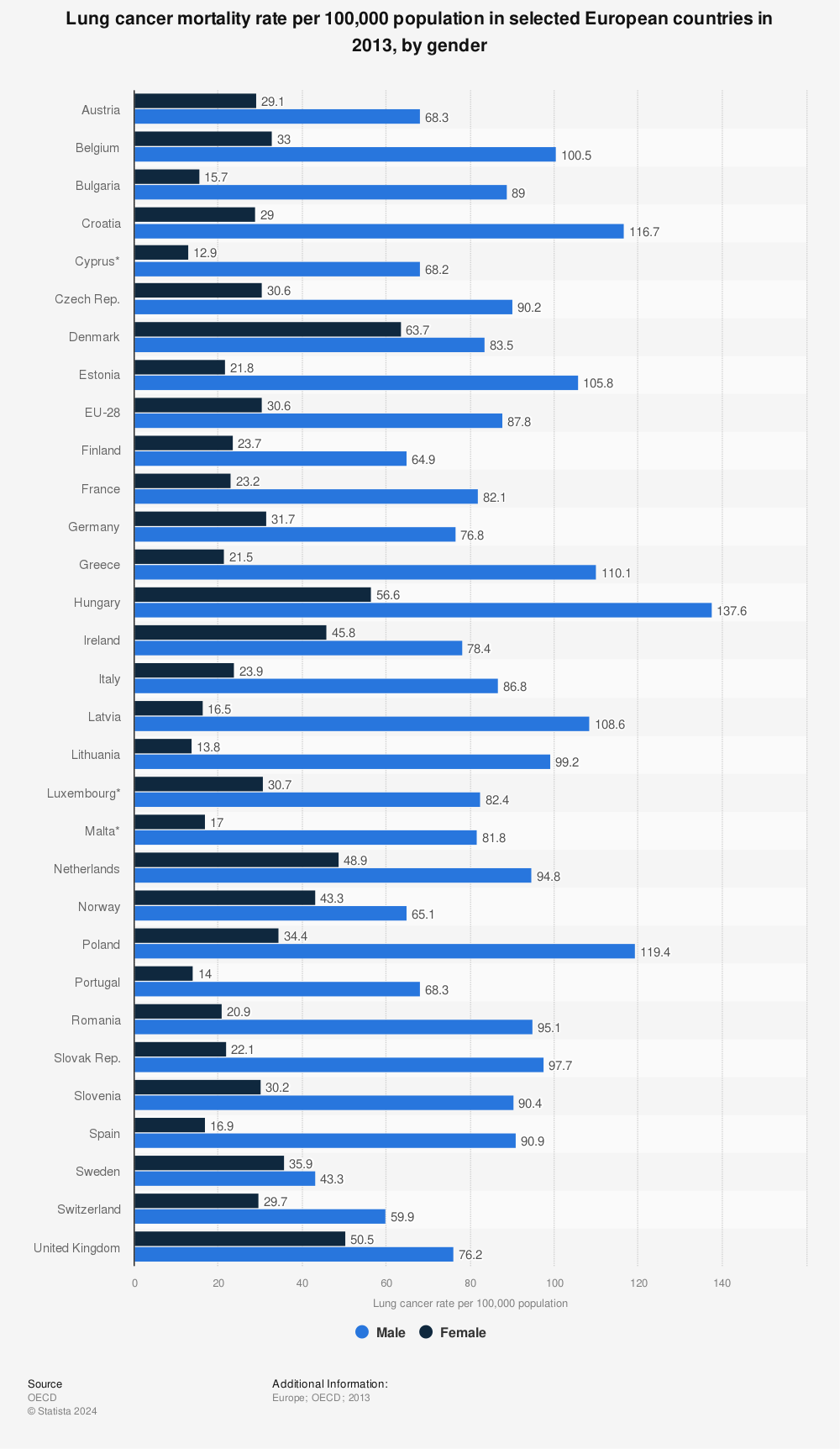In recent years, researchers have discovered a wealth of information related to the changes that occur in the cells of non-small cell lung cancer. Some of the most notable discoveries involve gaining an understanding of how the cells of this type of cancer grow. This has lead to the advancement of medications that target the changes associated with non-small cell lung cancer.
While chemotherapy is often used to treat non-small cell lung cancer (NSCLC), this type of therapy doesn’t target the specific changes that are associated with the disease. Targeted medications work differently in that they can work when chemotherapy doesn’t, and the side effects of these medications are often different and less severe than standard chemotherapy. Presently, targeted medications for NSCLC are primarily use for advanced cases. They can be use in conjunction with chemotherapy, or on their own.

Find more statistics at Statista
Lung Cancer Therapeutics that Target the Growth of Tumor Blood Vessels
In order for NSCLC tumors to grow, they have to create new blood vessels, which nourish the cancerous cells. This process is referred to as angiogenesis. The advancement of cutting-edge medications, known as angiogenesis inhibitors, prevent the development of new blood vessels.
There are currently two types of angiogenesis inhibitors, which include:
- Ramucirumab. This type of medication is used as a treatment for advanced NSCLC. It targets vascular endothelial growth factor (VEGF,) a type of protein that assists with the formation of new blood vessels. In order for VEGF to work, it has to bind to receptors, or proteins within the cells. Remucirumab is considered a monoclonoal antibody that specifically targets VEGF receptors. In other words, it prevents the development of new blood vessels. Typically, this NSCLC therapeutic is offered if other treatments are proving ineffective and is commonly given in conjunction with chemotherapy.
- Bevacizumab. Also used as a treatment for NSCLC, Bevacizumab is an antibody in the monoclonoal form, or a synthetic version of a specific type of protein found in the immune system. This drug works by targeting vascular endothelial growth factor, a type of protein that assists with the development of new blood cells. It is often used in conjunction with chemotherapy; however, if the cancer responds to the bevacizumab, chemotherapy may be halted and this medication may be delivered on its own until it the NSCLC cancer begins to grow again.
While these medications can be invaluable, there is a possibility for some rare side effects to occur. These side effects may include:
- Intense bleeding
- Blood clots
- The development of perforations in the walls of the intestines
- Complications with the heart
- Delayed healing of wounds
Due to the possibility of bleeding, these types of medications are usually not administered to patients who are taking blood thinners or who are bleeding when they cough. The risk of serious lung bleeding is the highest in people who have been diagnosed with squamous cell type non-small cell lung cancer.
Medications that Target Epidermal Growth Receptor Changes
A protein found on the surface of the cells of the lungs, epidermal growth factor receptor assists with the growth and division of cells under normal conditions. In some cases of NSCLC, too much epidermal growth factor receptor (EGFR) is present, which causes them to grow at an even faster rate. Medications known as ECFR inhibitors have the ability to prevent the signal from this protein that triggers the growth of cells.
EGFR Medications that Inhibit Gene Mutations
There are currently three drugs that are used to prevent gene mutations. These drugs include:
- Afatinib
- Erlotinib
- Gefitinib
These medications can be used on their own, without chemotherapy and as the first type of treatment administered for advanced NSCLC that have been found to exhibit specific mutations in the EGFR gene.
Medications that Inhibit EGFR that Target Other Cell Mutations
While medications that inhibit EGFR can reduce the size of NSCLC tumors for a prolonged period of time, eventually, these medications can stop working. Typically, this occurs because the cancerous cells have developed an additional mutation in the EGFR gene. T790M is one type of mutation that can occur. However, there are some more advanced medications that inhibit EGFR mutations that also combat cells in which the T790M mutation exists.
Generally, when EGFR inhibitors are no longer working, healthcare professionals will require an additional biopsy of the tumor. This biopsy will allow them to find out if a T790M mutation has occurred.
Medications that Inhibit EGFR in Squamous Cell Non-Small Cell Lung Cancer
The medication used to inhibit EGFR in squamous cell NSCLC is called Necitumumab. It is a synthetic antibody of a protein found in the immune system, and it targets EGFR mutations. This medication can be used in conjunction with chemotherapy as the first type of cancer therapy for advanced squamous cell NSCLC. It is usually administered intravenously.
For some patients, the potential to experience some side effects while using EGFR inhibitors does exist. These effects include:
- Irritations of the skin
- Sores in the mouth
- Diarrhea
- Decreased appetite
Medications that Target Cells that Exhibit ALK Gene Changes
An estimated 5 percent of non-small cell lung cancers will alter a gene known as ALK. This alteration usually affects patients who never smoked, or who only smoked lightly and have NSCLC with a adenocarcinoma subtype. When the ALK gene is altered, it leads to the production of ALK proteins with abnormalities. This leads to the growth and spread of cancerous cells.
Medications that are use to target the abnormal development of ALK protein include:
- Alectinib
- Ceritinib
- Crigatinib
- Crizotinib
These medications have the ability to reduce the size of NSCLC tumors in patients who present with a modified ALK gene. These medications can be effective if chemotherapy is no longer working, but they are usually used in lieu of chemo in patients who have the rearrangement of the ALK gene.
Some side effects of medications that inhibit ALK can include:
- Increased fatigue
- Nausea and vomiting
- Vision changes
- Constipation
